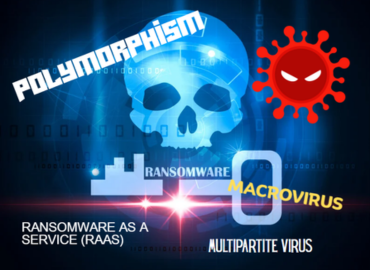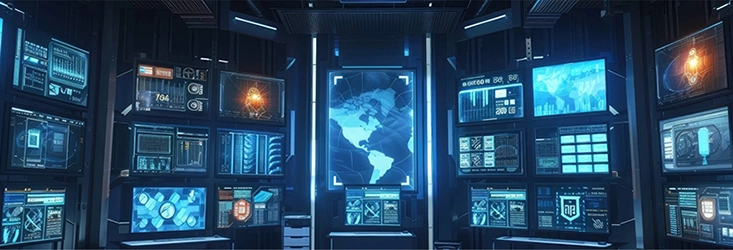What Are the Different Types of Computer Viruses?

With over 11 million new malware viruses in 2023 alone, the threat of computer viruses is becoming more significant by the day.
Understanding the different types of computer viruses and how to protect your company from them is crucial. This blog post will delve into the various types of computer viruses, their unique characteristics, and how you can prevent them from wreaking havoc on your company's systems and data.
What is a Computer Virus?
A computer virus is a program or code that attaches itself to an executable file, replicates itself, and spreads from one computer to another. A virus can cause a wide range of problems, including stealing sensitive data, damaging the operating system, and deleting files. Computer viruses can spread through email attachments, downloads from the internet, and even through physical devices such as USB drives.
Different Types of Computer Viruses
There are several types of computer viruses, each with its own unique characteristics and method of attack. Here are the most common types of computer viruses:
- File Infectors
File infectors are the most common type of computer virus. They attach themselves to executable files such as .exe, .com, and .sys file types. Once the infected file is executed, the virus code is activated, and the virus will spread to other files and computers.
- Boot Sector Viruses
Boot sector viruses infect a hard drive's boot sector, which is read first when a computer boots up. Once infected, the virus can spread to other disks and files. Boot sector viruses were prevalent in the past, but modern operating systems have built-in protections to prevent them.
- Macro Viruses
Macro viruses infect Microsoft Office documents such as Word or Excel. They spread through macros or small programs that automate tasks in these programs. Once the macro virus infects a document, it can spread to other documents and computers.
- Multipartite Viruses
Multipartite viruses are particularly hazardous because they can infect multiple parts of a computer system, including the boot sector and executable files. Additionally, they're challenging to detect and remove and can cause significant damage to a computer system.
- Polymorphic Viruses
Polymorphic viruses are viruses that can change their code to avoid detection. The virus code rewrites itself each time it replicates, making it difficult for antivirus software to detect and remove. Polymorphic viruses are becoming more prevalent as hackers become more sophisticated in their attacks.
10 Ways to Protect Your Company from Computer Viruses
It's essential to take steps to protect your company from computer viruses. Here are some tips to keep your company safe:
- Back-Up Your Data
Regularly backing up your data is crucial in the event of a virus infection. Make sure to back up your company's data to a separate location or device to ensure you can recover your data if it's lost or corrupted. This should be one of your first lines of defense, as it will ensure you have the ability to recover.
- Enable Two-Factor or Multi-Factor Authentication
Next, consider implementing Multi-Factor Authentication (or MFA), which adds an extra layer of security by requiring users to enter a code sent to their phone or another device in addition to their password. Enabling MFA for all company devices can help prevent unauthorized access.
- Use Firewalls
Firewalls can help prevent unauthorized access to your company's network. Ensure all devices are protected by a firewall and monitor their performance.
- Keep Software and Operating Systems Up to Date
Software updates often include security patches that address known vulnerabilities. An automated patching tool vs. a manual application can help ensure patches are applied quickly. In addition, ensure all software and operating systems are updated to ensure the best possible protection against viruses.
- Use Email Filtering
Since the vast majority of malware is received via email, it is one of the primary methods used by hackers to spread viruses. Use email filtering to block emails with suspicious attachments or links, and make sure employees are familiar with email best practices to help prevent infection.
- Install Business-Class Antivirus Software
After you have done all of the above, ensure you have an active, business-class anti-virus tool installed. It is essentially your last line of defense after a virus has gone through your firewall and made it past your SPAM filter to your actual computer. Also, take security up a notch by deploying behavior-based anti-virus software on all company devices. Behavior-based security is a cutting-edge approach to cybersecurity. It seeks to identify and protect against malicious activity by monitoring potential malware behavior, such as trying to infect a file or your computer and stopping it in its tracks.
- Use Strong Passwords
Weak passwords are an easy target for hackers. Establish a password management policy that educates and encourages all employees to use strong passwords and to change them regularly.
- Educate Employees
Employees are often the weakest link in the security chain. Therefore, educate all employees about the dangers of computer viruses, how to recognize them, and how to avoid them.
- Implement Network Segmentation
Network segmentation is the process of dividing a network into smaller subnetworks. By implementing network segmentation, you can limit the spread of a virus in case of an infection. This way, even if one network segment gets infected, it can't spread to other parts of the network.
- Conduct Regular Security Audits
Regular security audits can help identify your company's potential vulnerabilities. Conduct security audits at least once a year and take corrective measures to address any weaknesses or vulnerabilities found.
By implementing the tips outlined above, you can significantly reduce the risk of a virus infection and keep your company's data and systems safe. Remember, it's always better to be prepared than to deal with the consequences of a virus attack.
Keep Viruses at Bay with Pretecht by SSE
Protecting your company from computer viruses requires a proactive approach involving technical and organizational measures. At SSE, we know the importance of cybersecurity. Antivirus is a core part of our solution set, so partnering with us means fortifying your defenses against the rising virus threats with our comprehensive technology stack of cybersecurity tools called Pretecht.
Contact us today to discuss how SSE can help assess your potential vulnerabilities and protect your company’s data.
Additional Blog Posts

CMMC Deadlines: Defense Contractors Face High-Stakes Compliance Timelines
As the U.S. Department of Defense accelerates enforcement of the Cybersecurity Maturity Model Certification (CMMC), thousands of Defense Industrial Base…
DOJ Ramps Up Cyber-Enforcement on Defense Contractors
The Department of Justice’s recent $4.6 million settlement with defense contractor MORSECORP sends a clear message to the Defense Industrial…
